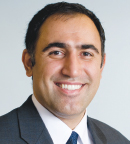The importance of achieving complete response after intensive therapy in older adults with acute myeloid leukemia (AML) was confirmed in a follow-up analysis of the E2906 North American Intergroup trial.1 Patients in complete response had superior survival in this landmark analysis. This finding holds true whether complete response is achieved after one or two cycles of therapy. The analysis also found that complete response is more strongly associated with improved survival than complete response with incomplete platelet recovery.
Audience interest in this talk was high, and there were many questions and comments following its presentation at the 2016 American Society of Hematology (ASH) Annual Meeting & Exposition.

The quality of complete response is important. It turns out that a complete response with incomplete platelet recovery is inferior to a complete response.— James Foran, MD
Tweet this quote
“It may seem an intuitive finding that complete response is important to achieve, but the community needed to confirm this. No one likes to give intensive therapy to older adults, but the only way to treat with curative intent and improve survival in AML is with intensive therapy. There has been therapeutic nihilism in the community about treating older adults. It’s been considered too hard to do. But now we know how to get people through intensive therapy with modern supportive care. This study should encourage oncologists to treat fit, eligible older AML patients with the goal of attaining complete response,” said lead author James Foran, MD, Associate Professor at the Mayo Clinic Cancer Center in Jacksonville, Florida.
Primary results of the E2906 trial were presented at the 2015 ASH Annual Meeting & Exposition.2 They showed that clofarabine (Clolar) was inferior to standard daunorubicin plus cytarabine (the 7+3 regimen) in older adults with AML.
“The study was negative for clofarabine but positive in that patients over age 60 who were fit in the standard intensive therapy arm had surprisingly good results with modern supportive care. Patients lived 50% longer than expected from historical experience. Results strongly support the use of intensive therapy for patients age 60 or older who are fit. The study raised the question of the importance of achieving complete response as an endpoint, which led to the present follow-up analysis,” Dr. Foran explained.
Study Details and Findings
The follow-up analysis sought to define factors associated with remission and early mortality. The study included 727 patients, with a median age of 68 years (range, 60–86 years). Median follow-up is now 18.3 months.
In a multivariate analysis, increasing age (ie, over 70 years) and performance status > 1 were significantly associated with 30-day mortality (P = .06 and P = .05, respectively). Only performance status > 1 was significantly associated with 60-day mortality (P = .06). Treatment arm (P = .003), adverse cytogenetics (P = .02), increasing age (P = .03), and low baseline white blood cell count (P = .03) were independently associated with the need for a second cycle of induction therapy. Performance status had no effect on the need for cycle two. Rates of complete response/complete response with incomplete platelet recovery and median overall survival were similar for those receiving one vs two cycles.
A landmark analysis was conducted in 608 patients beginning on day 60 to determine the impact of response on overall survival. Quality of response had an impact on overall survival. Complete response and complete response with incomplete platelet recovery were strongly related to median overall survival, but the effect of complete response with incomplete platelet recovery waned after the first year.
Update on Treating Older Patients With AML
- Patients with AML who achieve complete response have improved overall survival, regardless of whether they needed a second cycle of treatment.
- Fit patients and those with a good performance status should receive intensive therapy to improve survival.
- Complete response is more strongly associated with survival than complete response with incomplete platelet recovery.
- Leukemia-free survival after morphologic complete response (leukemia cells cleared from bone marrow) does not appear to be a useful criterion for predicting survival.
Overall survival was similar for patients with a morphologic leukemia-free status (leukemia cells cleared from the bone marrow) and those with treatment failure, suggesting that morphologic leukemia-free status is not a good prognostic marker or a meaningful response category, admitted Dr. Foran. The relative adverse effect of complete response with incomplete platelet recovery and morphologic leukemia-free status vs complete response was most pronounced in patients treated with clofarabine.
“Our study confirms the importance of achieving complete response in older adults with AML, even if they need more than one cycle of induction. We can better predict who is going to survive after therapy, and we know that one-third of patients will need two cycles of induction from this trial,” stated Dr. Foran.
He continued: “We also now know that the quality of complete response is important. It turns out that a complete response with incomplete platelet recovery is inferior to a complete response. Despite being a recognized response category, morphologic leukemia-free status is not associated with better outcome than treatment failure. Its value as a response criterion is questionable,” Dr. Foran concluded. ■
Disclosure: Dr. Foran reported no potential conflicts of interest.
References


